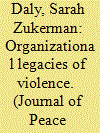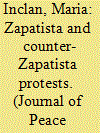|
|
|
Sort Order |
|
|
|
Items / Page
|
|
|
|
|
|
|
| Srl | Item |
| 1 |
ID:
113936


|
|
|
|
|
| Publication |
2012.
|
| Summary/Abstract |
Although several existing studies examine the economic impact of transnational terrorism by referring to its potential to reduce foreign direct investment (FDI), they overlook possible differences in the effects of business-related and non-business-related terrorism. We argue that the former type of terror negatively affects FDI since it damages multinationals' buildings, destroys their products, kills their employees, and causes a rise in insurance premiums. The latter type of terror, however, does not induce the same ramifications and should thus have little or less influence on a country's FDI. In order to examine the effects of these two different types of transnational terrorism, we employ three different statistical techniques using data gleaned from the International Terrorism: Attributes of Terrorist Events (ITERATE) dataset. A cross-sectional, time-series data analysis of 123 developing countries during the period from 1980 to 2008 reveals that transnational terrorism that harms multinational businesses contributes to a decrease of foreign investment but transnational terrorism that afflicts non-business-related targets is statistically irrelevant. This implies that when countries implement counterterrorism measures that are directly intended to mitigate the impact of business-related terrorist activities, they are likely to attract more foreign capital and should therefore realize a greater degree of economic development.
|
|
|
|
|
|
|
|
|
|
|
|
|
|
|
|
| 2 |
ID:
113939


|
|
|
|
|
| Publication |
2012.
|
| Summary/Abstract |
Transnational advocacy organizations are influential actors in the international politics of human rights. While political scientists have described several methods these groups use - particularly a set of strategies termed 'information politics' - scholars have yet to consider the effects of these tactics beyond their immediate impact on public awareness, policy agendas or the behavior of state actors. This article investigates the information politics surrounding sexual violence during Liberia's civil war. We show that two frequently-cited 'facts' about rape in Liberia are inaccurate, and consider how this conventional wisdom gained acceptance. Drawing on the Liberian case and findings from sociology and economics, we develop a theoretical framework that treats inaccurate claims as an effect of 'dueling incentives' - the conflict between advocacy organizations' needs for short-term drama and long-term credibility. From this theoretical framework, we generate hypotheses regarding the effects of information politics on (1) short-term changes in funding for human rights advocacy organizations, (2) short-term changes in human rights outcomes, (3) the institutional health of humanitarian and human rights organizations, and (4) long-run outcomes for the ostensible beneficiaries of such organizations. We conclude by outlining a research agenda in this area, emphasizing the importance of empirical research on information politics in the human rights realm, and particularly its effects on the lives of aid recipients.
|
|
|
|
|
|
|
|
|
|
|
|
|
|
|
|
| 3 |
ID:
113935


|
|
|
|
|
| Publication |
2012.
|
| Summary/Abstract |
Previous research indicates that a lack of state capacity is a key determinant of internal armed conflict. Scholars identify several internal dimensions of state capacity, but have yet to explore how international finance influences state resources. This is surprising because sovereign lending has increased dramatically in recent decades and plays an increasing role in the functioning of developed and developing governments. In this article, we explore this relationship between a state's integration into global credit markets and its subsequent capacity to promote domestic stability. We argue that international capital increases a state's ability to respond to internal opposition because states with favorable credit terms can expand their resource base beyond domestic constraints to deter, accommodate, or repress opposition while maintaining a level provision of resources to their political base. We examine the influence that both capital access and credit terms have on the risk of civil conflict in 141 countries from 1981 to 2007. Our empirical results indicate that states with affordable credit access are indeed less likely to experience civil conflict.
|
|
|
|
|
|
|
|
|
|
|
|
|
|
|
|
| 4 |
ID:
113941


|
|
|
|
|
| Publication |
2012.
|
| Summary/Abstract |
Why do insurgencies erupt in some places and not in others? This article exploits an original violent event database of 274,428 municipality-month observations in Colombia to determine the conditions favoring organized violence at the subnational level. The data cast doubt on the conventional correlates of war: poverty, rough terrain, lootable natural resources, and large, sparsely distributed populations. The evidence suggests that rebellions begin not in localities that afford sanctuaries, impoverished recruits, and abundant finances, but instead in regions providing receptacles of collective action: the organizational legacies of war. Specifically, the data indicate that regions affected by past mobilization are six times more likely to experience rebellion than those without a tradition of armed organized action. The significant correlation between prior and future mobilization is robust across different measurements of the concepts, levels of aggregations of the data, units of analysis, and specifications of the model. These include rare events and spatial lag analyses. These results highlight the need for micro conflict data, theory disentangling the causes of war onset from those of war recurrence, and a reorientation away from physical geography and back to the human and social geography that determines if rebellion is organizationally feasible. The findings suggest new avenues of research on the post-war trajectories of armed organizations, the causes of repeated war, and the micro-foundations of rebellion.
|
|
|
|
|
|
|
|
|
|
|
|
|
|
|
|
| 5 |
ID:
113937


|
|
|
|
|
| Publication |
2012.
|
| Summary/Abstract |
In a widely cited study, Collier, Hoeffler & Söderbom show that economic growth reduces the risk of post-conflict peace collapse - particularly when the UN is present with a peace mission. These findings are encouraging for interventionist international policymakers. We replicate their study using data from the UCDP/PRIO Armed Conflict Database instead of the Correlates of War database. We generate a series of different datasets on the basis of different coding criteria commonly used in the literature, and rerun a simplified version of their model. Our results do not support their findings regarding the risk-reducing effect of economic growth and UN involvement. At best, the results are mixed. Some of the models even suggest that economic growth may increase the risk of post-conflict peace collapse. Overall, we are forced to conclude that the impacts of economic growth and UN involvement on the risk of post-conflict peace collapse are neither clear nor simple. The differences in the results seem to be driven by two sources: the conflicts included in the original datasets and the coding of the start and end dates of the conflicts.
|
|
|
|
|
|
|
|
|
|
|
|
|
|
|
|
| 6 |
ID:
113938


|
|
|
|
|
| Publication |
2012.
|
| Summary/Abstract |
Why are some countries more prone to social violence than others? Despite the fact that annual deaths due to homicides worldwide outnumber those due to organized armed conflict by a factor of roughly 3 to 1, this question has received very little attention from conflict and development specialists in recent years. As a modest first step in addressing this gap in the literature we draw together insights from the conflict and criminology literatures to develop a model of social violence that accounts for both political-institutional and socio-economic factors. While there is an extensive literature on the socio-economic determinants of social violence, there are only a handful of studies that consider the significance of political-institutional arrangements. Using cross-country estimates of homicides produced by the World Health Organization as an indicator of social violence, we test our model using OLS regression analysis for a sample of more than 120 countries. We find that countries with 'hybrid' political orders experience higher rates of social violence than those with strong autocratic or strong democratic regimes, and that weakly institutionalized democracies are particularly violent. We also find robust associations between indicators of poverty, inequality and ethnic diversity and social violence. These results indicate that social and political violence share some common underlying causes. We conclude by suggesting that the apparent global decline in organized armed conflict and the concomitant rise in social violence in recent decades may be linked to world urbanization and the 'third wave' of democratization in the global South, although further research is required to confirm this hypothesis.
|
|
|
|
|
|
|
|
|
|
|
|
|
|
|
|
| 7 |
ID:
113940


|
|
|
|
|
| Publication |
2012.
|
| Summary/Abstract |
This study represents the first systematic analysis of the interactions between pro-Zapatista and counter-Zapatista protestors in Chiapas, Mexico, and the first empirical test of movement-countermovement theories in a transitional democracy. Three claims are tested: (1) movement protests trigger countermovement protest activity; (2) different political parties at different levels of government trigger movement-countermovement protest activity; and (3) victories won by one side of a conflict, viewed as procedural concessions, trigger further pro- and countermovement protest activity. These hypotheses are tested using negative binomial models and data on Zapatista-related protest activity between 1994 and 2003. The results show that: (1) movement and countermovement protests have a positive, reciprocal effect on both groups' future protest activity; (2) movement and countermovement protesting groups use the dominant political party as a target of protest. The characteristics of the electoral cycle and rise of multi-party competition at all levels of government do not have a consistent effect on protest activity; (3) granting procedural concessions to pro-movement actors generates more protest activity among both groups. However, granting procedural concessions via social programs and public works to the population irrespective of its sympathy to either side of the movement-countermovement conflict decreases movement protests and increases countermovement protests.
|
|
|
|
|
|
|
|
|
|
|
|
|
|
|
|
|
|
|
|
|